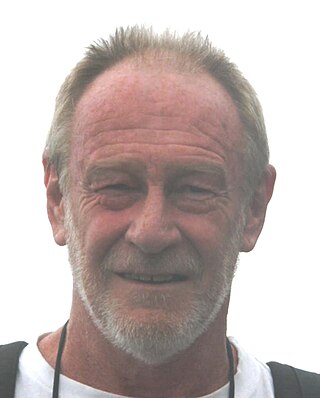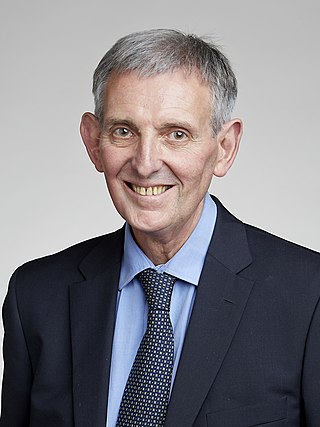Related Research Articles
Angela Vincent is Emeritus professor at the University of Oxford and a Fellow of Somerville College, Oxford.

Sir John Carew Eccles was an Australian neurophysiologist and philosopher who won the 1963 Nobel Prize in Physiology or Medicine for his work on the synapse. He shared the prize with Andrew Huxley and Alan Lloyd Hodgkin.

Torsten Nils Wiesel is a Swedish neurophysiologist. With David H. Hubel, he received the 1981 Nobel Prize in Physiology or Medicine, for their discoveries concerning information processing in the visual system; the prize was shared with Roger W. Sperry for his independent research on the cerebral hemispheres.

David Hunter Hubel was an American Canadian neurophysiologist noted for his studies of the structure and function of the visual cortex. He was co-recipient with Torsten Wiesel of the 1981 Nobel Prize in Physiology or Medicine, for their discoveries concerning information processing in the visual system. For much of his career, Hubel worked as the Professor of Neurobiology at Johns Hopkins University and Harvard Medical School. In 1978, Hubel and Wiesel were awarded the Louisa Gross Horwitz Prize from Columbia University. In 1983, Hubel received the Golden Plate Award of the American Academy of Achievement.

John Zachary Young FRS, generally known as "JZ" or "JZY", was an English zoologist and neurophysiologist, described as "one of the most influential biologists of the 20th century".

Donald Metcalf AC FRS FAA was an Australian medical researcher who spent most of his career at the Walter and Eliza Hall Institute of Medical Research in Melbourne. In 1954 he received the Carden Fellowship from the Anti-Cancer Council of Victoria; while he officially retired in 1996, he continued working and held his fellowship until his death in December 2014.

Leon Mestel was a British-Australian astronomer and astrophysicist and Emeritus Professor at the University of Sussex. His research interests were in the areas of star formation and structure, especially stellar magnetism and astrophysical magnetohydrodynamics. He was awarded both the Eddington Medal (1993) and the Gold Medal of the Royal Astronomical Society. Following his retirement, he wrote several obituaries and biographical articles on physicists and astrophysicists.

Sir Colin Blakemore,, Hon was a British neurobiologist, specialising in vision and the development of the brain. He was Yeung Kin Man Professor of Neuroscience and senior fellow of the Hong Kong Institute for Advanced Study at City University of Hong Kong. He was a distinguished senior fellow in the Institute of Philosophy, School of Advanced Study, University of London and Emeritus Professor of Neuroscience at the University of Oxford and a past Chief Executive of the British Medical Research Council (MRC). He was best known to the public as a communicator of science but also as the target of a long-running animal rights campaign. According to The Observer, he was both "one of the most powerful scientists in the UK" and "a hate figure for the animal rights movement".
Andrew Cockburn FAA is an Australian evolutionary biologist who has been based at the Australian National University in Canberra since 1983. He has worked and published extensively on the breeding behaviour of antechinuses and superb fairy-wrens, and more generally on the biology of marsupials and cooperative breeding in birds. His work on fairy-wrens is based around a detailed long-term study of their curious mating and social system at the Australian National Botanic Gardens.
In evolutionary biology, the flying primate hypothesis is that megabats, a subgroup of Chiroptera, form an evolutionary sister group of primates. The hypothesis began with Carl Linnaeus in 1758, and was again advanced by J.D. Smith in 1980. It was proposed in its modern form by Australian neuroscientist Jack Pettigrew in 1986 after he discovered that the connections between the retina and the superior colliculus in the megabat Pteropus were organized in the same way found in primates, and purportedly different from all other mammals. This was followed up by a longer study published in 1989, in which this was supported by the analysis of many other brain and body characteristics. Pettigrew suggested that flying foxes, colugos, and primates were all descendants of the same group of early arboreal mammals. The megabat flight and the colugo gliding could be both seen as locomotory adaptations to a life high above the ground.
Mandyam Veerambudi Srinivasan AM FRS, also known as "Srini", is an Australian bioengineer and neuroscientist who studies visual systems, particularly those of bees and birds.

Peter John Snow is an Australian neuroscientist and author.
James Dickson Murray FRSE FRS, is professor emeritus of applied mathematics at University of Washington and University of Oxford. He is best known for his authoritative and extensive work entitled Mathematical Biology.
William Anthony Harris FRS FMedSci is a Canadian-born neuroscientist, Professor of Anatomy at Cambridge University, and fellow of Clare College, Cambridge. He was head of the Department of Physiology, Development and Neuroscience since its formation in 2006 until his retirement in 2018.

Sir John Vincent McCanny is the emeritus Regius Professor of Electronics and Computer Engineering at Queen's University Belfast, and director of the Institute of Electronics, Communications and Information Technology.
Hugh Allen Oliver Hill FRSC FRS, usually known as Allen Hill, was Professor, and later Emeritus Professor, of Bioinorganic Chemistry at the University of Oxford and Honorary Fellow of The Queen's College, Oxford, and Wadham College, Oxford. He was elected a Fellow of the Royal Society in 1990 and was awarded the 2010 Royal Medal of the Royal Society "for his pioneering work on protein electrochemistry, which revolutionised the diagnostic testing of glucose and many other bioelectrochemical assays.".

Michael A. Häusser FRS FMedSci is professor of Neuroscience, based in the Wolfson Institute for Biomedical Research at University College London (UCL).
Richard Alan North FRS is a British biomedical scientist, and Professor Emeritus at the University of Manchester. North grew up in Halifax, West Yorkshire and attended Heath Grammar School, before studying at University of Aberdeen. He graduated in medicine and in physiology (BSc). He took a PhD in the group of Hans Walter Kosterlitz, and worked in Aberdeen hospitals as house office and registrar.

David Alastair Standish Compston is a British neurologist. He is an emeritus professor of neurology in the Department of Clinical Neurosciences at the University of Cambridge and an emeritus fellow of Jesus College, Cambridge.
Perry Francis Bartlett is an Australian neuroscientist. He was awarded the Florey Medal in 2015.
References
- ↑ Who's Who in Australia 2013, Crown Content, 2012.
- 1 2 "Emeritus Prof Jack Pettigrew". Archived from the original on 24 July 2007. Retrieved 7 March 2007.
- ↑ "John Pettigrew | Royal Society". Archived from the original on 10 May 2019. Retrieved 10 May 2019.
- ↑ https://honours.pmc.gov.au/honours/awards/1125903 [ bare URL ]
- ↑ Donald E Mitchell, The Man from Ironbark: a profile of Professor Jack Pettigrew FRS, flamboyant sensory systems researcher and recipient of the H Barry Collin Research Medal, Clinical and Experimental Optometry 94, pp. 494–501 (2011)